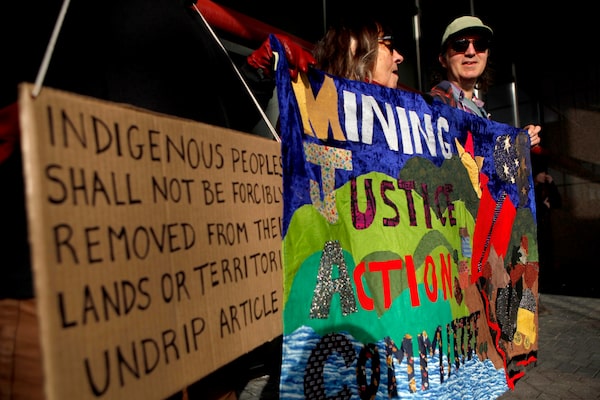
Wet'suwet'en supporters and Coastal GasLink opponents protest 20 government buildings throughout Victoria, Feb. 14, 2020.CHAD HIPOLITO/The Canadian Press
Colleen Collins is interim CEO and vice-president, Marla Orenstein is director of the Natural Resources Centre at the Canada West Foundation.
Canada has had its hand slapped.
In December, the Committee on the Elimination of Racial Discrimination – part of the United Nations Office of the High Commissioner for Human Rights – tabled a decision. Acting under its “early warning and urgent action procedure,” the committee called for Canada to suspend construction and cancel all permits for the Trans Mountain pipeline expansion, Site C hydroelectric dam and Coastal GasLink natural gas pipeline.
The reason? It felt that the Canadian government had not obtained “free, prior, and informed consent” from all affected Indigenous groups, and that it had not fully and adequately discharged its duty to consult.
That’s quite a claim. And it’s also quite a stretch.
The committee claims that the Government of Canada has engaged in a “refusal to consider free, prior and informed consent as a requirement for any measure, such as large-scale development projects." This is just nonsense, and shows that the committee clearly hadn’t done its homework before issuing its condemnation.
Whether or not you agree with the government’s decision to approve these projects, it is difficult to characterize almost 10 years of consultation undertaken by project proponents, the regulator and the federal government – combined with numerous judicial reviews in the highest courts, substantive accommodation measures and the enshrinement in the Constitution of the duty to consult – as a “refusal to consider” the preferences of affected Indigenous groups.
But this minor verbal smack points to a bigger problem: the UN Declaration on the Rights of Indigenous Peoples (UNDRIP or “the Declaration”).
UNDRIP was put forward by the UN in 2007. It sets out the collective and individual rights of Indigenous people, particularly in relation to cultural expression, identity, language, employment, health, education and, critically, resource development.
The Canadian government first endorsed the aspirations of the Declaration in 2010. But there is a good reason why Canada has not yet adopted it into legislation: because actually implementing the wording of the Declaration under Canadian law is extremely difficult.
One example of this difficulty is provided by Ken Coates, a senior fellow at the Macdonald-Laurier Institute (and a strong supporter of the Declaration), who notes that UNDRIP requires governments to provide Indigenous people with “education in their own culture and provided in their own language.” As Mr. Coates states, “more must be done to reverse the tragic decline of Aboriginal languages and culture. Nevertheless, providing high-quality education in Indigenous languages – there are 75 separate language groups across the country, many with populations of under 1,000 people, and large numbers dispersed in cities – would be a monumental undertaking with little guarantee that it could be done effectively.”
Similarly, then-attorney-general Jody Wilson-Raybould explained in 2016: “We can’t just take all 46 articles of the declaration and put it into legislation. We need to look at each article. We need to … operationalize that based on the priorities that Indigenous communities are bringing forward … and how we can, the federal government, partner in that.”
Another problem of implementing UNDRIP was highlighted by charges the UN committee levelled at the Government of Canada. There is no working definition – either within Canada or from the UN – of what comprises free, prior and informed consent. The committee is asking the Canadian government to ignore its own legislation, including the Constitution, and immediately revoke decisions that have been developed through a rigorous process, and tested in Canadian courts. It is asking the Canadian government to ignore the community consensus expressed by the elected Chiefs and Councils along both pipeline routes.
It will take a lot of time and money to figure out how to implement UNDRIP in a way that is faithful to the intentions of the Declaration, meaningful to Canada’s Indigenous peoples and workable within the framework of the Constitution and existing legislation. But as Ms. Wilson-Raybould has also noted, “the cost of not implementing the declaration, the cost of not building a nation-to-nation relationship with Indigenous peoples in this country would far outreach any cost it would take to operationalize it.”
Both the Declaration and the Truth and Reconciliation calls to action need to be addressed in a way that is responsible and workable, and not merely aspirational. It must recognize Canada’s existing obligations to Indigenous people under the Constitution and treaties. It must also accommodate the fact that different Indigenous groups have different priorities, and that some groups rely on resource wealth as a pillar of economic reconciliation.
Alternatively, nothing will happen. Just saying UNDRIP is adopted doesn’t make it so – if it can’t be implemented, it represents lip service that will be ignored. That would be a tragic result.